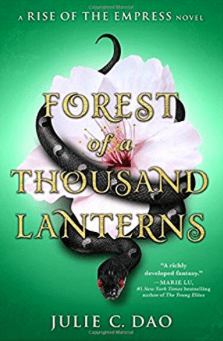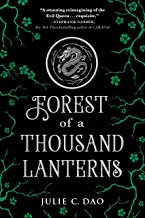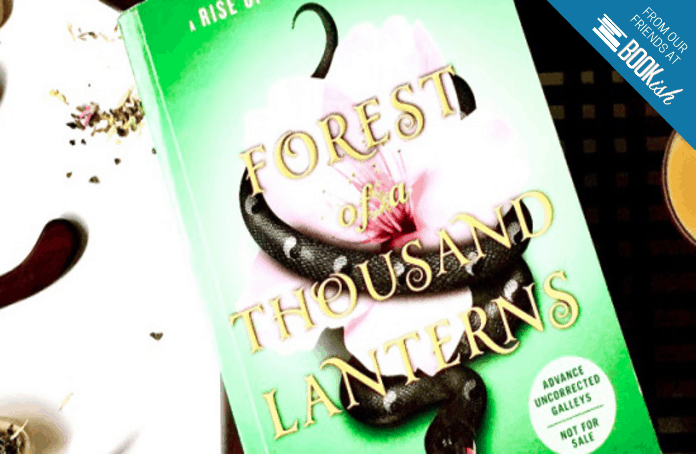Forest of a Thousand Lanterns by Julie C. Dao
 BookTrib is partnering with Bookish to bring you more great content. Bookshelf, bookshelf, on the wall. What is the most anticipated fall release of all? To be fair, there are quite a few. But Julie C. Dao’s Forest of a Thousand Lanterns has been at the top of our list for a while. It’s a dark fairy tale retelling that reimagines the Evil Queen from “Snow White” rising to power in a world inspired by Imperial China. To celebrate the book’s release, we chatted with Dao about writing a villain, the power of beauty, and why you should never, ever underestimate any of her female characters.
BookTrib is partnering with Bookish to bring you more great content. Bookshelf, bookshelf, on the wall. What is the most anticipated fall release of all? To be fair, there are quite a few. But Julie C. Dao’s Forest of a Thousand Lanterns has been at the top of our list for a while. It’s a dark fairy tale retelling that reimagines the Evil Queen from “Snow White” rising to power in a world inspired by Imperial China. To celebrate the book’s release, we chatted with Dao about writing a villain, the power of beauty, and why you should never, ever underestimate any of her female characters.
Bookish: Forest of a Thousand Lanterns is a retelling/origin story for the Evil Queen from “Snow White.” Which elements of the original tale or character did you want to keep? Which elements did you want to leave behind?
Julie C. Dao: I wanted it to be a completely original reimagining of “Snow White” that was like nothing I had seen before in YA, but I also wanted to hold on to important elements of the old fairy tale. It’s crucial, when writing a fairy tale retelling, to ground the reader in your story. I wanted to make my reader feel comfortable, make them think this is going to be like the tale with which they’re familiar, and then… yank the rug from underneath them! From the original “Snow White,” I wanted to keep the magic mirror, the apple, and the stepmother/stepdaughter dynamic, but I twisted these concepts to fit my own purposes. In doing this, I hoped to make the reader still recognize the inspiration behind the story, but at the same time think of FOTL as fresh and new.
Bookish: What is the hardest part of writing a villain? What is your favorite part?
JCD: I knew I had my work cut out for me with someone like Xifeng who has a character arc that spirals downward. My biggest concern was making her somewhat sympathetic, even as she makes all the wrong choices and succumbs to her own greed for power. That was the hardest part: making her believable in some capacity. My favorite part was putting myself in the shoes of someone so completely different from me and everything I believe in—someone who has no moral boundaries whatsoever when it comes to their ambition. It was an interesting experience!
Bookish: The Evil Queen is famously vain, and in the book we see Xifeng grow from resenting how her beauty defines her to learning to use it as a gift and a weapon. How do you view the relationship between beauty and power?
JCD: I knew, in writing a “Snow White”-inspired tale, that I wanted to keep beauty as power and a status symbol in my story. Classic fairy tales favor youth and attractiveness above all and consistently depict older female characters as evil. So what would happen if a princess grew older and her beauty faded according to society’s standards? The stories seem to insist that the aging princess accept this fate, this loss of her perceived importance as a human being. If she dared to fight against this or resent a younger woman, then she was deemed the Evil Queen/Stepmother.
Basically, according to fairy tales, women were supposed to be young and beautiful until they were not, and then go away. I think our society would like to believe we are beyond this, but the worshipping of physical beauty persists. The perception of beauty may change, but the value placed upon it never does. Outward attractiveness—however defined, depending on the time and place—is seen to help get people ahead and earn them attention.
In Forest, Xifeng recognizes that her youth and beauty are vital assets. She’s clever and educated, but believes her physical attributes will win her the throne and help her keep it, and she’s terrified of losing them. This increasing fear and paranoia propel her toward a tragic choice: She essentially sells her soul for the assurance that she will never lose her looks. She is not a queen punished for aging; she is a queen whose self-inflicted punishment is that she herself cannot see her own worth beyond the prejudices of beauty.
Bookish: Xifeng has a Lady Macbeth moment of seeing blood that no one else can see. Did Lady Macbeth also serve as an inspiration for Xifeng?
JCD: Actually, she was not, but I can totally see what you mean! Lady Macbeth is the instigator behind her husband’s deeds and the blood on her hands is guilt for what she has indirectly wrought, if I remember correctly. For Xifeng, however, the blood that appears on her face is a symbol and a reminder that her beauty is fleeting—that once gone, she will have lost what she considers to be her greatest power. Also, Xifeng would never be content pulling the puppet strings in the background. She would want to be front and center!
Bookish: Underestimating women is a big theme in this book. We see Xifeng overlooked as “just a pretty face” time and again, but we also see her fail to realize how strong the Empress truly is. What drew you to this theme?
JCD: It is ironic that Xifeng hates being underestimated, yet falls victim to doing this to other women, isn’t it? I’m drawn to powerful female characters, and when I say “powerful,” I mean all different types of power. So often in fiction and film we associate female strength with perceived traditional masculine characteristics, like wielding a sword and being physically aggressive. But there are so many types of power people are often too happy to overlook: the power of knowing your truth, of being confident in yourself, of protecting the people you love and the beliefs you value, of charging toward your destiny no matter what cost. I wanted to show different types of female strength in book one, and in book two you will see even more. Every single woman I write has a power of her own and should never, ever be underestimated!
Bookish: We see Xifeng and other women judged harshly for their aspirations in a way the male characters are not. Was this element inspired by the Evil Queen’s lust for power or by more modern influences?
JCD: This element was mostly inspired by the patriarchal society in which I chose to set the book, which is a kingdom inspired by Imperial China. Female historical figures like Empress Wu dealt with much prejudice and censure for their methods in seeking power. And yet, when reading about her deeds, it didn’t seem to me like anything the Empress did hadn’t already been done by male rulers of her time. But they didn’t come under the same kind of scrutiny and criticism. The double standard still exists today, unfortunately, with powerful women in fields like business and politics being criticized for qualities for which their male counterparts are praised.
Bookish: At times, Xifeng’s motivation shifts from wanting to claim her destiny to wanting that destiny because of the freedom it promises. Do you think that, in a way, chaining herself to her fate means losing her freedom?
JCD: Absolutely. There’s an irony in that. The thing about Xifeng is that she doesn’t understand the concept of power. She believes that being Empress is all about being front and center, invincible, and feared and loved and respected—which it partly is, in this world. But it’s also a position of responsibility, in that she is tying herself to the fates of everyone involved: She would be the Emperor’s wife, the Crown Prince’s stepmother, and the ruler of everyone in Feng Lu, for whom she is expected to care and govern. It’s a case of not looking at the long haul, the whole picture. She’s charging toward something she does not fully understand yet.
Bookish: The Crimson Army is an army made up entirely of women who live in the mountains. These fighters are only briefly mentioned; will we get to see them in future installments?
JCD: Yes! Without giving away too much, you will find out a lot more about them in book two!
Bookish: Can you give us three words that describe book two?
JCD: Epic adventure quest!





